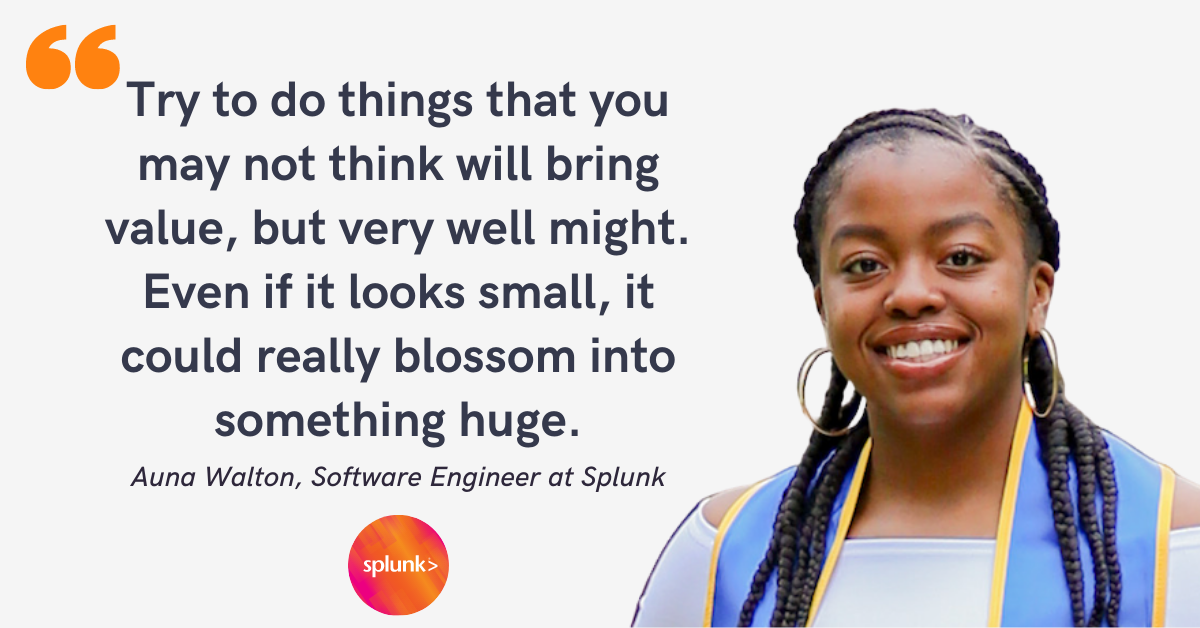Auna Walton designed her first website in high school.
She later built on that skill set while studying computer science in college.
But it wasn’t until her first Silicon Valley internship where she learned what it really meant to be a software engineer, which is her current job title at data platform company Splunk, Inc. It was less of neat assignments and more of pushing out features, and Auna rose to the occasion.
“In the classroom, all the parameters are set up nicely for you. In the real world, things aren’t set up perfectly. You may not have this, or that, and projects are undefined. You have to figure out both the problem and the solution,” she says.
But Auna is comfortable tackling problems and speaking up about how she solves them, which has been a boon to her work. We sat down with Auna to hear more about how she’s built a satisfying career, and why she’s excited to keep growing at Splunk.
Tip 1: Ask for what you need
Auna was sitting through a presentation in college about an alum’s startup when she realized that she had a lot to learn from him.
She went up to the founder, Michael, after the presentation, showed him the website she’d built for a local nonprofit during her senior year of high school and asked if she could work with him on his company’s site.
Michael said yes, and Auna credits that early professional experience with setting her up for success with future internships.
“It’s hard to go to someone and say, ‘Give me this,’ if you don’t have anything to offer,” says Auna. “So put in the time first. I know it’s not easy—you have schoolwork and you’re a human being and you need to rest—but spend time working on side projects, because it shows people what you can do.”
Having that experience on her resume prepared Auna well to do her school’s semester in Silicon Valley program, structured like a co-op model, where she worked at a startup and took classes in the area.
“It was stressful in that it was a lot of work with only six engineers. They actually used their interns. The training wheels were off, and Michael was no longer there for mentorship. But it helped me move at a faster pace and figure things out on my own,” says Auna.
Tip 2: Work to understand, even if it’s uncomfortable
Auna’s first exposure to Splunk was at the Grace Hopper Celebration (GHC), a global women in tech conference, where her school sponsored her to attend. Splunk had reached out to meet with Auna before the conference began, and upon arrival, Auna says she was immediately impressed with the company's witty t-shirt taglines and warm energy.
She got an offer to become an intern, and was placed on the company’s engineering productivity team. She helped build a tool that measured productivity, identified roadblocks and bottlenecks, and showed which stage each feature was at so that teams could make improvements based on real data insights.
When she was first assigned the project, though, Auna didn’t quite see the value in it—and she decided to tell her manager that.
“I remember thinking, ‘Okay, there’s a lot of ways this can go wrong, because I’m an intern, I’m a Black woman, and I don’t want to come off aggressive; I don’t want to step on any toes,’” says Auna. “But the culture at Splunk is truly collaborative. I knew my manager was an open-minded person and a really nice guy. I felt like I could go and give him my perspective.”
The conversation with her manager went well; he appreciated her questions and shared some of his own doubts about the project. “It was interesting to hear that managers don’t always know everything, either, and that they’re looking for their team members to contribute ideas,” says Auna.
She shifted her mindset into how she could improve the project, and ended up working with other engineers to make a tool that was more useful to them.
Tip 3: Do your best on all your work, even what seems small
After finishing her internship, Auna accepted a full-time offer at Splunk and moved to the Bay Area to start work. While she’s been mostly remote because of the pandemic, she’s happy to have made the move and to have stuck with Splunk. (Though she is now on an external-facing team—a move that her management fully supported.)
Auna says she feels taken care of by Splunk, citing benefits like extra time off called “pandemic days” that employees can take to deal with health concerns or family responsibilities and a “power hour” each day in which employees are encouraged to spend 60 minutes of each workday focused on their mental or physical wellbeing.
“Sometimes I tell my parents about these benefits and they’re like, ‘Are you guys working over there?’” says Auna, laughing. “It truly feels like we’re all a team. If we have the mentality that we can take breaks, we can keep working towards our goals. And it’s about all of us. If I’m successful on my project, we’re all successful as a company.”
With her renewed energy, Auna is able to dedicate herself fully to her work, and encourages budding engineers to find ways to do the same. As an example, she cites a collaborative side project she built with two engineering productivity interns during a Splunk hackathon—and put her all into—that has grown into something that the company uses every day.
“Try to do things that you may not think will bring value, but very well might,” she says. “Even if it looks small, it could really blossom into something huge.”
If Splunk sounds like the place for you, too, check out their open roles!




